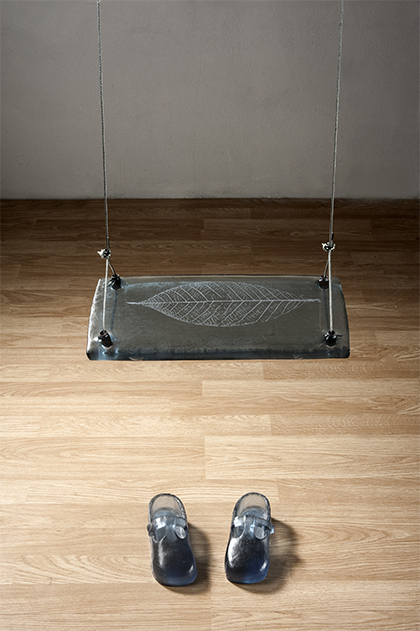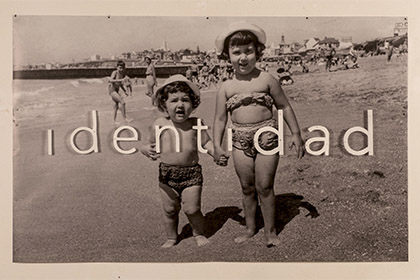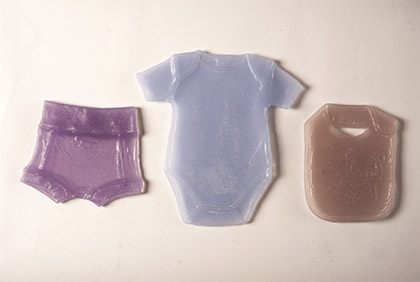You are here: American University College of Arts & Sciences American University Museum 2015 Identidad by Silvia Levenson
Contact Us
Media Contact: Rebecca Basu (202-885-5950) basu@american.edu
Contact:
Media Contact: Rebecca Basu (202-885-5950) basu@american.edu
Identidad by Silvia Levenson January 24 through March 15, 2015

É volata via (She Flew Away), 2000.
Kilncast glass and steel cable, 118 x 17 x 9 in.
Photo credit: Cristiano Vasalli.
Image courtesy of Bullseye Gallery.

I-d-e-n-t-i-d-a-d, 2014.
Photo on paper, glass powder, 79 x 55 in.
Photo credit: Marco Del Comune.
Image courtesy of the artist.

Recovered Identity (Details), 2014.
Kilncast glass, 116 glass baby clothes.
Photo credit: Marco Del Comune.
Image courtesy of the artist.
Exhibition Overview
In her exhibition
Identidad, Silvia Levenson channels her identity as a survivor of the Argentinian Dirty War and her emotional connection to the Grandmothers of the Plaza de Mayo in order to push the bounds of her skills as a glassmaker and produce refined glass work. "I feel that glass is the ideal medium for conveying this mixed feeling of beauty, fragility and tension that represents our human condition."
Identidad will pay homage to the Grandmothers of the Plaza de Mayo in Argentina. The Grandmothers of the Plaza de Mayo is a human rights organization founded in 1977 with the mission of locating children kidnapped during the repression. Silvia will create 111 glass pieces of baby clothing to represent the number of cases solved by the Grandmothers.
Identidad will educate the public on the solemn history of the Argentinian Dirty War as well as the significant impact of the Grandmothers campaign. Moreover, the exhibition will expose viewers to the skillful work of this profound international glassmaker. In 1976, Silvia was 19 years old and pregnant with her daughter Natalia. March 24, 1976, the date of Natalia's birth, is a well-remembered date in Argentinian history as it marked the beginning of the 7-year dictatorship. Between 1976 and 1983, the military dictatorship kidnapped, tortured, and killed about 30,000 people known as "los desaparecidos" or "the disappeared." Thirty percent of those kidnapped were young women, many with children by their side or in their womb. These children were later stripped of their identity and given up for adoption. The Grandmothers of the Plaza de Mayo work to find the abducted children and return them to their natural family. Levenson and her daughter Natalia were not kidnapped and therefore, she feels like a survivor. Levenson channels her identity as a survivor and her emotional connection to the Grandmothers of the Plaza de Mayo in order to push the bounds of her skills as a glassmaker and produce the refined glass works in Identidad. "I feel that glass is the ideal medium for conveying this mixed feeling of beauty, fragility and tensions that represent our human condition."
